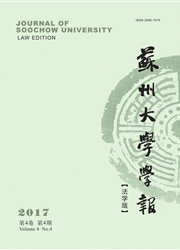

 中文摘要:
中文摘要:
国务院《进一步深化中国(上海)自由贸易试验区改革开放方案的通知》已颁布一年多,如何落实好该方案中关于“支持国际知名商事争议解决机构入驻”的条款,兼具理论价值和实践意义。鉴于我国现行仲裁法律规范的滞后性,无论是在入驻前,亦或是在入驻后,国际仲裁机构在我国开展仲裁服务均存在障碍和诸多不确定因素。具体涉及约定外国仲裁机构在华仲裁的协议效力、仲裁裁决的司法监督、仲裁裁决的承认与执行,以及国际仲裁机构的市场准入等问题。为了更好地落实《深化改革方案》,需以自贸区为试验平台,加快构建相关配套制度,如明确国际商事仲裁机构的准入条件、摸索国际仲裁机构入驻区内的多元模式、调整《仲裁法》部分条款在区内的适用、明确“仲裁地标准”,以及出台相关司法解释等。
 英文摘要:
英文摘要:
With the "Notification of Advancing the Reform and Open up in China ( Shanghai ) Pilot Free Trade Zone" ( referred as FTZ ) being implemented for about 1 year, how to enforce the relevant provision herein, that is to "encourage famous international dispute resolution institution to enter Shanghai FTZ", has become an important topic both from the perspective of theory and legal practice. Due to the lagging development of the existing Chinese arbitration legal system, there are certain legal barriers and uncertainties for foreign arbitration institutions, both before and after their establishment in FTZ. The specific issues include "the legitimacy of arbitration agreements made by foreign arbitration institutions in mainland China", "judicial review, recognition and enforcement of such arbitration" and "the market access of foreign arbitration institutions". To settle these issues and uncertainties, it is suggested to clarify the market access standard of foreign arbitration institutions, introduce multiple mode of establishment, adjust the application of certain arbitration law provisions and legal standard in FTZ and introduce judicial interpretation. Pilot projects in the FYZ will eventuallv provide valuable experience for the modification and modernization of Chinese arbitration law.
 同期刊论文项目
同期刊论文项目
 同项目期刊论文
同项目期刊论文
 期刊信息
期刊信息
